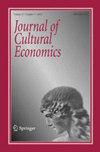Peter Tschmuck: The economics of music, 2nd edition
IF 2
2区 经济学
Q2 ECONOMICS
引用次数: 0
Abstract
The music industry is a dynamic and complex phenomenon that provides ample opportunity for fruitful economic analysis. Music is regularly covered by studies on the economics of the wider cultural economy, but there are few books that focus exclusively on the economics of music. Peter Tschmuck’s “The economics of music” in 2017 is; however, one rare exception. The book is published by Agenda Publishing and belongs to their series “The economics of big business” where other volumes cover businesses such as airlines, arms, and fishing. In 2021, a second edition was published. There were definitely good reasons to update this book, since over the second half of the 2010s, the recorded music industry has grown by 50% and its logic has been fundamentally transformed. This transformation, as well as the growth, was primarily driven by music streaming platforms (e.g. Apple Music, Spotify and Deezer), which expanded their combined share of the recorded music revenues from 20% in 2015 to 62% in 2020. One should not underestimate the challenge of keeping a volume on “the economics of music” up to date in such turbulent times, and Tschmuck, who teaches at the University of Music and Performing Arts, Vienna, deserves recognition and admiration for giving it a go. The publisher explains that the second edition includes a new analysis of the impact of the Covid-19 pandemic, “as well as trends in the industry, such as the increasing dominance of tech companies and big data”. So, how well is the book able to capture the economic workings of the contemporary music industry? As is commonplace in industry overviews, the introductory chapter discusses the definition of the music industry, its boundaries and sub sectors. The frameworks of the music industry and the wider music economy presented in this chapter are useful overviews of the complexities of the music business. Chapter one provides a brief historic overview of the music business. There is a plethora of such accounts in other volumes about the music industry, but TschmuckPeter Tschmuck:音乐经济学,第二版
音乐产业是一个动态而复杂的现象,为富有成效的经济分析提供了充足的机会。音乐经常被广泛的文化经济经济学研究所涵盖,但很少有书专门关注音乐经济学。Peter Tschmuck 2017年的《音乐经济学》是;然而,有一个罕见的例外。这本书由议程出版社出版,属于他们的“大企业经济学”系列,其他系列包括航空、武器、渔业等企业。2021年,第二版出版。我们有充分的理由更新这本书,因为在2010年代的后半段,唱片音乐产业增长了50%,其逻辑也发生了根本性的转变。这种转变和增长主要是由音乐流媒体平台(如Apple music、Spotify和Deezer)推动的,这些平台将其在录制音乐收入中的总份额从2015年的20%扩大到2020年的62%。在这样一个动荡的时代,人们不应该低估保持一本“音乐经济学”与时俱进的挑战,在维也纳音乐与表演艺术大学任教的茨穆克值得认可和钦佩。出版商解释说,第二版包括对Covid-19大流行影响的新分析,“以及行业趋势,例如科技公司和大数据的日益主导地位”。那么,这本书能在多大程度上捕捉到当代音乐产业的经济运作呢?正如在行业概述中常见的那样,导论章节讨论了音乐产业的定义,它的边界和子部门。本章介绍的音乐产业框架和更广泛的音乐经济是对音乐商业复杂性的有用概述。第一章简要介绍了音乐产业的历史概况。在其他关于音乐产业的书中有很多这样的描述,但是Tschmuck
本文章由计算机程序翻译,如有差异,请以英文原文为准。
求助全文
约1分钟内获得全文
求助全文
来源期刊

Journal of Cultural Economics
ECONOMICS-
CiteScore
5.20
自引率
18.50%
发文量
26
期刊介绍:
Cultural economics is the application of economic analysis to all of the creative and performing arts, the heritage and cultural industries, whether publicly or privately owned. It is concerned with the economic organization of the cultural sector and with the behavior of producers, consumers and governments in that sector. The subject includes a range of approaches, mainstream and radical, neoclassical, welfare economics, public policy and institutional economics. The editors and editorial board of the Journal of Cultural Economics seek to attract the attention of the economics profession to this branch of economics, as well as those in related disciplines and arts practitioners with an interest in economic issues. The Journal of Cultural Economics publishes original papers that deal with the theoretical development of cultural economics as a subject, the application of economic analysis and econometrics to the field of culture, and with the economic aspects of cultural policy. Besides full-length papers, short papers and book reviews are also published.Officially cited as: J Cult Econ
 求助内容:
求助内容: 应助结果提醒方式:
应助结果提醒方式:


